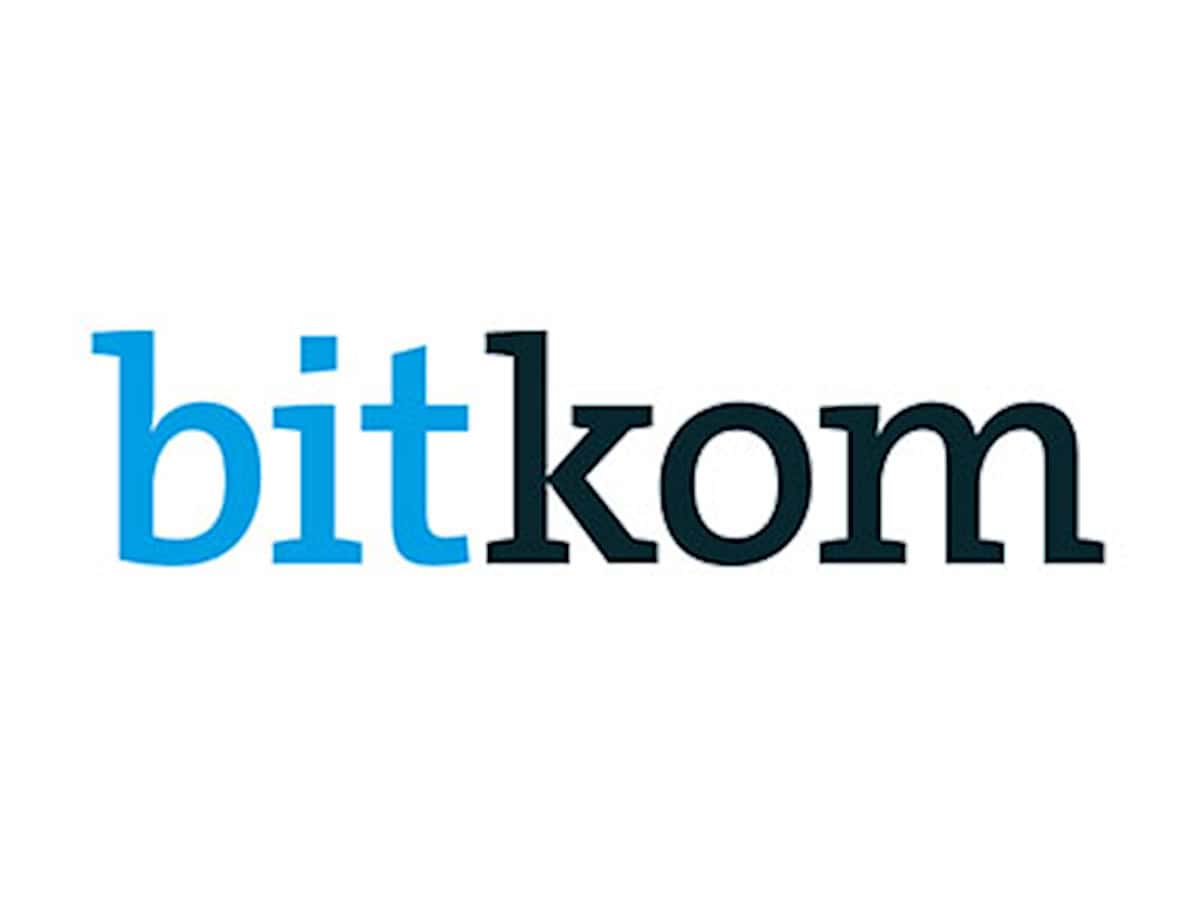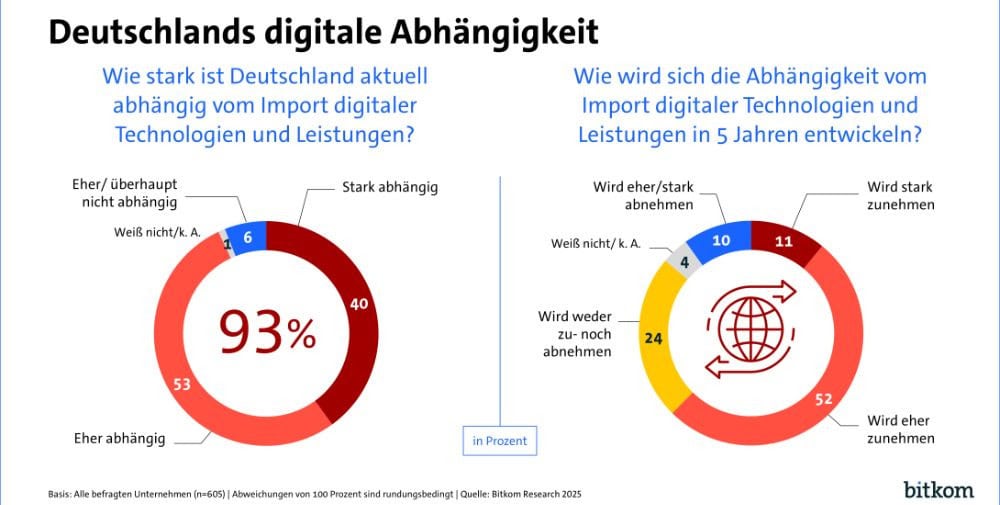
So dependence on the US and China has risen again over the course of this year: 51% of German companies see themselves as “heavily dependent” on the United States – in January 2025, 41% said the same. And 51% also see themselves as “highly dependent” on China – an increase of seven percentage points compared to the start of the year. According to their own information, German companies could currently only survive for 12 months if they were no longer able to source technologies or services from the USA – with regard to China, it would only be 11 months. “Germany and Europe must free themselves from one-sided dependencies and take their digital future into their own hands,” says Bitkom President Dr. Ralf Wintergerst. “Europe must develop its digital sovereignty with more determination. We need to make Europe a place where digital technologies are not only used, but also developed and translated into competitive products and services. The European Digital Sovereignty Summit should be the starting signal for this.”
Currently, 93% of companies believe that Germany is heavily dependent (40%) or somewhat dependent (53%) on digital technologies and services from abroad. Only 10 percent assume that this dependency will have decreased in five years. A quarter (24%) expect the status quo to continue, while 6 out of 10 companies (63%) anticipate an increase in dependency.
Nearly no company can manage without digital imports
In total, nearly no company in Germany can manage without importing digital technologies and services (96%). At the top of the list are end devices such as smartphones or notebooks, which 93% of companies import. Digital components or hardware components such as chips, semiconductors or sensors are sourced from abroad by 74%, software applications by 72% and cyber security applications such as firewalls by 67%. Digital devices and machines, for example for production, are imported by 60 nt of companies. Digital services such as app programming or IT consulting are sourced from outside Germany by 41%. A very small proportion of companies (3 percent) sometimes do not know whether and which technologies are sourced from abroad.
USA and China are the most important countries of origin
The most important countries and regions of origin are the USA and China. 67 percent import “frequently” from the USA, 23 percent “occasionally”, meaning that the United States is a trading partner for 9 out of 10 companies that import digital technologies and services. 58 percent import “frequently” from China, a further quarter (25 percent) “in individual cases”. Taiwan (21% “frequently”/ 24% “occasionally”) is also a significant Asian trading partner. Almost every second company that imports digital technologies or services considers itself dependent on this comparatively small island state (49%, 26% “highly dependent”, 23% “somewhat dependent”). Wintergerst: “The German economy is comparatively dependent on Taiwan, as key industries such as the automotive and electronics sectors rely on high-performance chips produced there. China’s aggression against Taiwan therefore directly threatens supply chains and production capacities in Germany.”
Japan is also an important country of reference: 12% of companies import from there “frequently”, 31% “in individual cases”. France – Germany’s partner at the upcoming summit in Berlin – is also important for the local economy: one in ten companies (10 percent) “frequently” sources digital technologies and services from the neighboring country and twice as many (20 percent) at least in individual cases. The same applies to the rest of the EU (16% “frequently” / 28% “in individual cases”) and the UK (11% “frequently” / 19% “in individual cases”). Incidentally, only one percent of the companies surveyed named Russia as a trading partner. “A country is digitally sovereign if it has its own substantial capabilities in key digital technologies and can decide for itself which countries it sources digital technologies from,” emphasizes Ralf Wintergerst. “The German economy must free itself from one-sided dependencies and it must be able to react appropriately if it is put under pressure by supplier countries.”
The highest levels of trust in France, Japan and the EU
German companies’ trust in individual countries varies greatly. The leaders in the trust ranking include France (76 percent), Japan (72 percent) and the other EU countries (68 percent). They are followed by the UK (58%), India (45%) and South Korea (40%). In terms of existing or potential business relationships, 58% have little or no confidence in South Korea, while this applies to 53% in India. The USA and China are at the bottom of the rankings. Just over a third (38%) still have confidence in the United States – compared to 51% in January. 60 percent have little or no confidence in the USA, while 70 percent have confidence in China. By contrast, 26% have confidence in the People’s Republic – the figure was similar at the start of 2025.
The loss of confidence in the USA is measurably linked to Donald Trump’s election as US president a year ago. For 33 percent, Trump’s presidency has had a direct or indirect “very negative” impact on their own company, while a further 46 percent speak of “somewhat negative” effects. For 19 percent, there has been no impact, and for not a single company has the situation changed for the better since then. “The unpredictability and protectionism of the US government are unsettling German companies – many are already feeling the consequences directly. This is another wake-up call for Europe to push ahead with its own digital and economic sovereignty,” emphasizes Wintergerst. If the focus is not on their own company, but on Germany as a whole, the majority of companies nevertheless rate the USA as a reliable partner for Germany (52%).
Germans demand more independence from foreign countries
In another study, Bitkom conducted on the occasion of the Summit for European Digital Sovereignty to determine the views of the German population on the topic and the relationship with the USA and China. More than 1,100 people were surveyed on a representative basis. Here too, a majority of 59% say that the USA is a reliable partner for Germany – with regard to China, 42% say the same. Nevertheless, the dependence on digital technologies is very present for an overwhelming majority: 44% of Germans consider Germany to be “very dependent” and 50% “somewhat dependent” on imports from abroad. 98% – and therefore practically all – consider it important for Germany to become more independent when it comes to important digital technologies. Wintergerst: “People in Germany have understood the seriousness of the situation: Almost everyone wants more independence when it comes to key digital technologies. Trust in partners such as the USA or China has suffered greatly recently. Strengthening our digital sovereignty and competitiveness is at the top of the agenda for the next three years of the legislative period.”
The German economy is particularly concerned about the USA. 99% of companies see further financial burdens from punitive tariffs or sanctions as a risk, 56% fear export restrictions and 49% fear the USA withdrawing from international organizations such as NATO or the WTO. Companies consider the associated economic risks to be more significant than digital risks: every second company (49%) fears a loss of access to software and platform services, while 41% fear a forced outflow of sensitive company data to US authorities. 37% are concerned about more difficult access to technologies such as chips or AI systems. Only 14% see restrictions on cloud services as a threat. Wintergerst: “The European tech market remains attractive and makes a significant contribution to the turnover of technology companies. US companies need Europe as a customer. Nevertheless, we need our own European offerings so that we are not vulnerable to blackmail.”
Summit meets with great approval
As such, 86% of companies welcome the upcoming summit for European digital sovereignty. 92% believe that Germany and France should play a leading role in strengthening Europe’s digital sovereignty and 82% emphasize that close Franco-German cooperation in the digital sector strengthens the competitiveness of the European economy as a whole. There is also a lot for Germany to do from a business perspective: 94% call for increased investment in key technologies and 62% for the establishment of European hyperscalers, i.e. large cloud providers. Wintergerst: “Only those with their own expertise can operate on an equal footing internationally – and Germany must strengthen its position in a targeted manner to achieve this.”
From Bitkom’s perspective, this also requires the development of a powerful cloud and data center infrastructure in Germany and Europe. It is also important to build up its own capabilities in the key technologies of artificial intelligence, quantum computing, the industrial metaverse and IT security. The expansion of Germany into a center of chip production is also part of this. National measures must be closely interlinked with activities at EU level. It is not just about surviving the international competition for subsidies. “Reliable framework conditions, well-trained specialists and an administration that accelerates rather than slows down investments are crucial,” says Wintergerst. The introduction of the European Digital Identity Wallet must also be driven forward. “The EUDI wallet is a key instrument for strengthening digital sovereignty. It enables citizens and companies to organize identity data and digital proofs in a secure, self-determined and cross-border manner.” The first implementations of the EUDI wallet will be presented at the summit on November 18. On the initiative and with the mediation of Bitkom, more than 60 companies have signed a declaration of intent to provide applications for the EUDI wallet.
– – – – – –
Further links
👉 www.bitkom.org
Graphic: Bitkom




